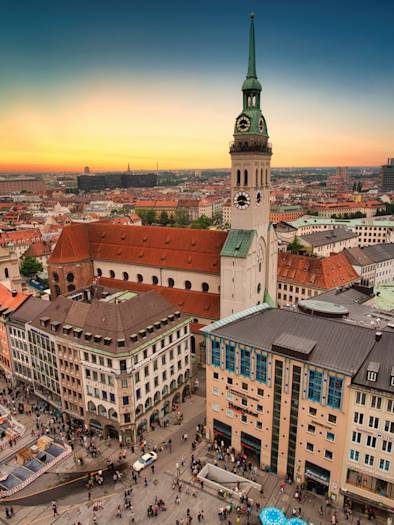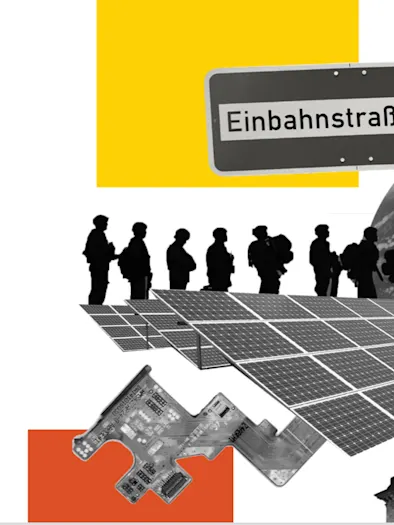
End of an era: How things are shaping up for Germany’s 2021 federal election
2021 has been a “super election year” in Germany. There were and there will be a number of important elections on the state as well as the local levels. The big event, however, is the federal election on September 26th.
It will bring an end to Angela Merkel’s time as chancellor, as she announced already in 2018 that she would not run for a 5th term. This is the first time since the founding of the Federal Republic in 1949 that the incumbent is not running for re-election.
So, after 16 years of Merkel in office and four legislative terms, this truly will be the end of an era.
The election will also almost certainly bring an end to the current coalition between the center-right CDU/CSU and the Social Democrats that has governed the country since 2013 (and, prior to that, from 2005-09).
Candidates
So, with only a few days to go until September 26th, where do things stand?
Three parties have announced candidates for chancellor:
The Greens have done so for the very first time in history. Their candidate is Annalena Baerbock, 40, currently co-Chair of the party.
The candidate of the center-right block of CDU and CSU, Angela Merkel’s political home, is Armin Laschet, 60, currently Prime Minister of North Rhine-Westphalia, Germany’s most populous federal state.
The Social Democrats have chosen Olaf Scholz, 63, currently Finance Minister in Angela Merkel’s coalition government.
Annalena Baerbock experienced a surge of popularity after her candidacy was announced in April. Her popularity has since declined as a result of a perceived lack of leadership experience and personal shortcomings (she is said to have “pimped” her CV and has been accused of plagiarism in a book she recently published).
Armin Laschet entered the race as the clear favorite to succeed Angela Merkel, given the CDU/CSU’s solid performance in the polls over a long period of time throughout the pandemic. However, he has never been a very popular candidate even among members of his own party and its core constituencies. The competition for him to get nominated was gruesome. By now it has become clear that his lack of personal popularity, scandals involving members of the CDU/CSU, and significant missteps by the candidate himself in the context of the July floods have led the Laschet campaign into very muddy waters.
Regardless of these challenges, it looked certain well into July that only Mr. Laschet or – with an outsider’s chance – possibly Annalena Baerbock might lead the new government. Olaf Scholz did not seem to stand a chance of winning.
Turbulent Developments
What followed has been nothing less than stunning.
Germans do not elect the chancellor directly, instead casting votes for parties and local candidates in 299 electoral districts across the country. The chancellor is then elected by the members of the Bundestag, the federal parliament.
Therefore, while the perceived competence, leadership qualities and the overall sympathy factors of the candidates for chancellor obviously do play an important role in people’s voting decisions, what ultimately counts is which parties they will vote for.
For a seemingly endless period, the Social Democrats’ poll numbers were disastrous – far from what would be needed to lead a new government. Within just a few weeks, however, their polling results increased from about 15% to now 25%. This development really only began in late July.
The CDU/CSU, meanwhile, has moved in the opposite direction: Up until February and going back into 2020, it consistently polled at about 35%. Its demise began in February, the announcement of Armin Laschet’s candidacy in April did not help, and things finally began imploding in July.
Olaf Scholz – to the surprise of many – is suddenly the clear front runner in the race for the chancellery. While the Greens and their candidate peaked early and were not able to sustain the momentum and the Laschet campaign has never really taken off, Scholz has done the seemingly impossible: He somehow manages to project both “continuity” on the one hand and a “fresh start” on the other hand. His sober and rational personality is an almost perfect personification of Angela Merkel, and he has shown to be a competent leader on the national stage as Germany’s current Finance Minister. At the same time, he does not belong to Merkel’s party and would be leading a federal government as head of a different coalition.
The Numbers
While the SPD and Olaf Scholz are leading the pack, Armin Laschet – despite his poor showing in public opinion polls – may still have a shot at the chancellorship. Let’s have a look at how and why that is possible.
In the most recent polls, we see the Social Democrats in the lead at approximately 25%. The CDU/CSU gets approximately 21%. The Greens come out at 17%, the liberal FDP at 12%.
The populist right AfD stands at 11% – not relevant for the question of a new government, as nobody will be willing to enter a coalition with them. The smallest party to win seats in the new parliament, according to the polls, would be the far-left “Die Linke”, barely clearing the 5% threshold.
This trend has stabilized in recent weeks and is to be taken seriously. However, the possibility of a big surprise on voting day cannot be counted out. If we look at longer periods of time, the volatility of things becomes obvious: In May, the Greens were in the lead, still in early August the CDU/CSU.
What Can We Expect?
While the results on election day may still differ from what the most recent polls suggest, some things are already shaping up:
In all likelihood, three parties will be needed to form a government – which in itself is complicated and not a learned tradition in Germany at the federal level.
Scholz is the favorite for leading the new government, with still remaining chances for Laschet. A new government led by the Greens’ Annalena Baerbock is, by now, merely a hypothetical scenario.
At least five coalition options might be possible – which further complicates the picture. With such a result, it is unclear how and under whose leadership coalition negotiations would take place. A convoluted and possibly chaotic period of parallel discussions and negotiations between the parties involved would be likely.
Predictions on a new government’s priorities in individual policy fields would be highly speculative at this stage. Depending on the specific party constellations and the unpredictable momentum of coalition talks, everything might be subject of negotiations and difficult compromises will need to be made.
It looks like a prolonged period of negotiations would be likely. As a result, Angela Merkel might still be in office by the end of the year.
That also means that Germany would not be in a position to lead on the international stage for many months to come.
Coalition Options
Potential coalitions are typically named after the traditional colors of the parties (CDU/CSU: black; SPD and Die Linke: red; Green Party: green; FDP: yellow) and the flags or objects they resemble:
“Kenya” (SPD, CDU/CSU, Greens): would enjoy clear majority; hard to imagine that CDU/CSU or SPD would join as junior partners
“Germany” (SPD, CDU/CSU, FDP): would be popular in the business community; hard to imagine that CDU/CSU and SPD would join as junior partners
“Jamaica” (CDU/CSU, Greens, FDP): failed attempt in 2017; possibly the only realistic option for Laschet to become chancellor; hurdle: strong competition and ideological issues between Greens and FDP
“Traffic Light” (SPD, Greens, FDP): FDP will seek to avoid entering coalition with two left-of-centre parties
“R2G” (SPD, Greens, Linke): unlikely given Die Linke’s radical positions on foreign policy







